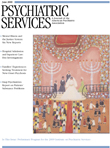Numerous media stories have reported on rising substance use in post-U.S.-invasion Iraq (
1 ). This study was intended to present a first profile of drug use in clinical populations. Psychiatrists were chosen as the best data source because they are the primary mental health professional in Iraq and are responsible for directing care for all psychiatric problems, including addiction.
A brief questionnaire was completed by 83% (N=58) of the 70 psychiatrists working in Iraq in 2006. The questions referred to patients misusing substances whom the psychiatrists had encountered while working either for the Iraqi National Health Service or in their private practice (most Iraqi physicians work in both). The psychiatrists were asked to respond with regard to all patients who were having substance use problems, not just those seeking addiction treatment per se.
Almost all (N=53, 91%) of the psychiatrists characterized the age of most patients with substance use problems as being between 18 and 40 years. There was also broad agreement (N=49, 84%) among respondents that most patients were unmarried.
Respondents completed two forced-choice, six-item lists asking which drug was most commonly misused by patients and asking where patients would most often obtain these drugs. As shown in
Table 1, the results point strongly toward diverted pharmaceuticals as the leading drug problem among Iraqi patients. The prevalence of use of trihexyphenidyl and medications with anxiolytic effects may stem in part from the population's being under substantial stress in an environment where alcohol is both highly stigmatized and difficult to obtain (
2 ).
Finally, respondents were asked a yes-no question, "Do you think the easy accessibility is the main cause of addiction in Iraq?" Almost all respondents (N=48, 83%) answered yes.
Psychiatrists' perceptions of clinical populations will not likely represent the nature of drug use in the broader Iraqi population. Nor can the data here speak to the perceptions of the 17% of Iraq's psychiatrists who did not complete the survey, who may differ in some unknown respects from those who responded. But this study's results can reasonably be taken to show that it is legal rather than illegal substances that are generating significant misuse problems among most Iraqi patients. This is not surprising given the extensive looting of pharmacies, diversion of pharmaceuticals, and fraud in pharmacies (
2 ). More stringent monitoring of the pharmaceutical system at all levels will be necessary to lower the population's exposure to potentially addictive drugs.
Acknowledgments and disclosures
Opinions are those of the authors and do not necessarily represent official positions of the Iraqi or United States government.
The authors report no competing interests.


